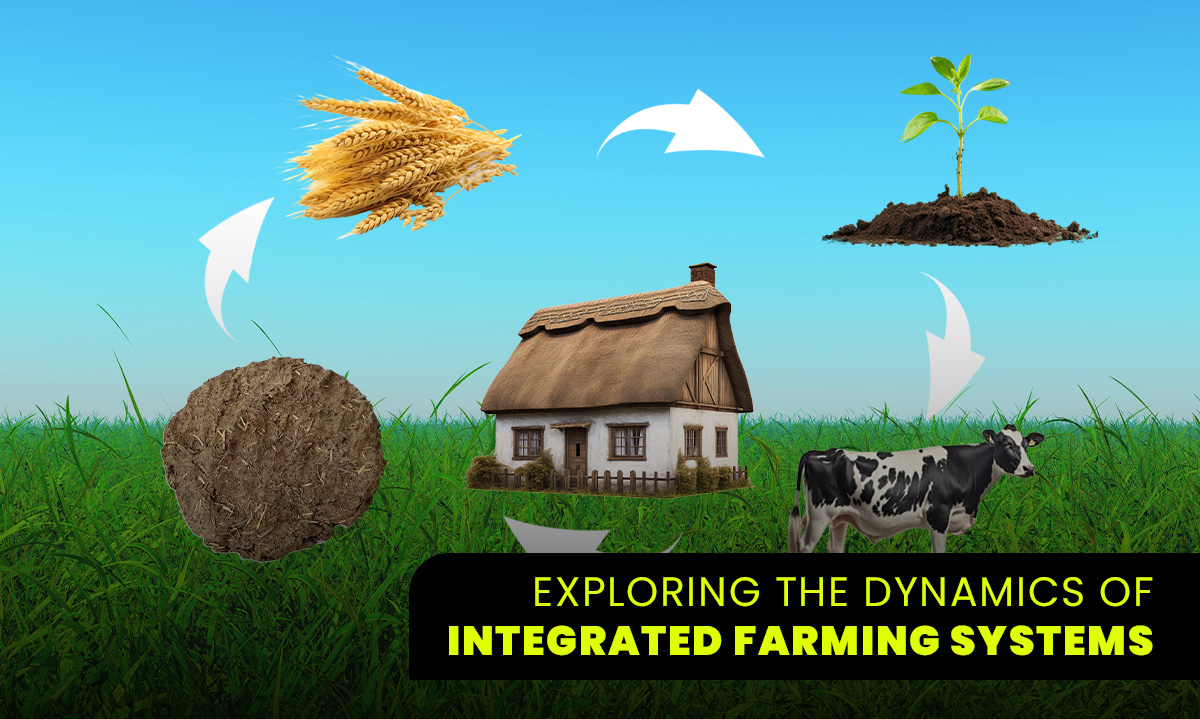Exploring the Dynamics of Integrated Farming Systems

As we delve deeper into the dynamics of Integrated Farming Systems (IFS), it becomes evident that this approach embodies a fundamental shift in our relationship with the land. It's not just about maximizing yields or profits in the short term but about nurturing a resilient and regenerative agricultural ecosystem that can sustainably support life for generations to come.
Synergy in Action: A Closer Look at Integrated Farm Components
Let's take a closer look at how the various components of an integrated farm interact to create synergies that enhance productivity and sustainability:
Crop-Livestock Integration: Integrating crops and livestock is a hallmark of IFS. Grazing animals on cover crops or crop residues not only provides them with nutritious forage but also helps in weed control and nutrient recycling. Similarly, animal manure enriches the soil with organic matter and essential nutrients, reducing the need for synthetic fertilizers.
Agroforestry Systems: Agroforestry, the practice of integrating trees and shrubs into agricultural landscapes, offers a myriad of benefits. Trees provide shade, shelter, and windbreaks for crops and livestock, while their roots help prevent soil erosion and improve water infiltration. Agroforestry systems also yield additional products such as fruits, nuts, and timber, diversifying income streams for farmers.
Aquaculture Integration: In regions with access to water bodies, integrating aquaculture with other farming activities can be highly beneficial. Fish ponds can serve as nutrient sinks, utilizing excess nutrients from livestock manure or crop runoff. Additionally, fish waste can be used to fertilize crops, closing the nutrient loop and minimizing environmental pollution.
Cover Crops and Green Manures: Cover crops play a crucial role in IFS by protecting the soil from erosion, suppressing weeds, and improving soil health. Leguminous cover crops, such as clover or vetch, also fix atmospheric nitrogen, reducing the need for synthetic fertilizers. After termination, cover crops can be incorporated into the soil as green manure, enriching it with organic matter and nutrients.
Challenges and Considerations in Implementing Integrated Farming Systems
While the benefits of integrated agriculture farming are substantial, implementing and managing such systems come with their own set of challenges and considerations:
Knowledge and Skills: Transitioning to modern integrated farming requires a diverse skill set and knowledge base. Farmers need to understand the principles of agronomy, animal husbandry, forestry, and aquaculture, as well as ecological interactions and system dynamics. Training and extension services play a crucial role in building capacity and disseminating best practices.
Market Access and Value Chains: Integrating multiple enterprises can complicate marketing and value chain management. Farmers need to identify niche markets for their products, establish partnerships with processors and distributors, and navigate regulatory requirements. Collaborative initiatives such as producer cooperatives or community-supported agriculture (CSA) schemes can help overcome these challenges.
Risk Management: Diversification inherent in integrated farming can mitigate risks associated with market volatility, pests, diseases, and adverse weather events. However, farmers must carefully manage trade-offs between different enterprises and anticipate potential conflicts or disruptions. Adequate insurance coverage, risk-sharing agreements, and contingency plans are essential to safeguard against unforeseen circumstances.
Resource Constraints: Limited land, water, and capital can pose significant barriers to adopting integrated farming practices, particularly for small-scale and resource-constrained farmers. Innovative financing mechanisms, government subsidies, and support programs can help overcome these barriers and incentivize investment in sustainable agriculture.
Environmental Impact of Integrated Farming Systems
The environmental impact of Organic Integrated Farming Systems (IFS) is profound and multifaceted, offering a promising solution to many of the pressing environmental challenges facing modern agriculture. One of the key benefits lies in the conservation of natural resources. By promoting biodiversity and soil health, IFS helps safeguard essential ecosystem services such as water purification, pollination, and carbon sequestration. Diverse cropping systems and agroforestry practices mitigate soil erosion, reduce nutrient runoff, and enhance water retention, contributing to watershed health and resilience against climate change-induced extremes.
Furthermore, the reduction in external inputs such as synthetic fertilizers and pesticides minimizes chemical pollution and mitigates adverse effects on soil, water, and biodiversity. Integrated pest management (IPM) strategies, such as biological control and crop rotation, help suppress pests and diseases without resorting to harmful chemicals, thereby preserving beneficial insects and microbial communities. Additionally, the integration of livestock and crop production facilitates nutrient cycling and waste recycling, closing nutrient loops and reducing greenhouse gas emissions associated with conventional farming practices. Overall, Integrated Farming Systems offer a holistic approach to agriculture that not only enhances productivity and profitability but also fosters environmental stewardship and resilience in the face of global environmental challenges.
Conclusion: Cultivating a Sustainable Future
In conclusion, Integrated Farming Systems represent a paradigm shift towards a more holistic, regenerative approach to agriculture. By harnessing the power of synergy and diversity, these systems offer a pathway toward sustainable food production, environmental stewardship, and rural livelihoods. While challenges exist, the potential benefits far outweigh the costs, both for farmers and society at large. As we strive to feed a growing global population while safeguarding our planet's resources, integrated farming stands out as a beacon of hope, cultivating harmony between humans, nature, and the land.
Latest Blog
JOIN OUR COMMUNITY !
Stay connected with Getfarms! Follow us on social media for the latest updates, exclusive offers, and a glimpse into the world of farmhouse living. Join our community today




























